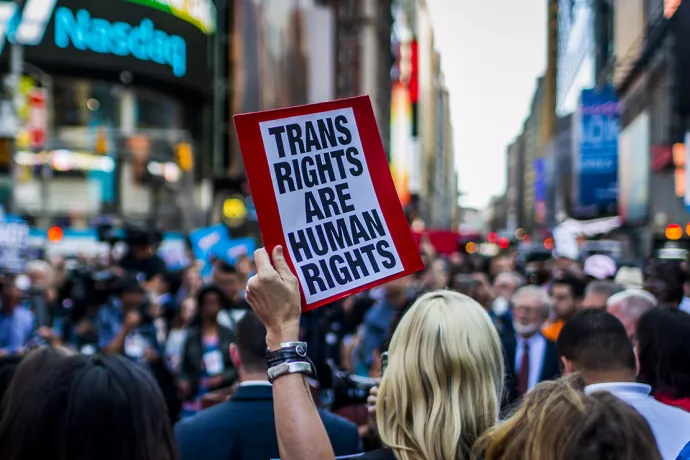
UTM professor spearheads new initiative that bridges humanities and digital studies
Imagine being able to hear Kimberly Nixon’s own words as she describes being turned away as a volunteer at a Vancouver rape crisis centre because of her status as a trans woman.
Or, having an app to report on corporate pollution in the north, near and on Indigenous lands.

Professor Elspeth Brown of U of T Mississauga says these are examples of critical digital humanities research that can make an impact on the world. And she has just secured nearly $3 million in funding for the next three years to make the university a global leader in this area of research through the new Critical Digital Humanities Initiative (CDHI).
“It’s about building a network of faculty members who do critical digital humanities at U of T,” says Brown, director of the CDHI and historical studies professor at UTM.
Brown, who is also director of the university’s Digital Humanities Network, spearheaded the tri-campus initiative that will bridge the humanities with digital technology tools – particularly focusing on anti-racist, feminist, queer and decolonial scholarship and researchers. But it will also support digital humanities work in general across the U of T campuses.
Brown says that digital humanities can be defined many different ways, but describes it as an interdisciplinary field bridging the humanities and computational or digital studies.
“We define the digital humanities broadly, to include all the communities and methods, tools, and platform-based approaches often associated with digital humanities, such as archiving, digitizing, curation, analysis, coding, editing, visualization, mapping, modelling, versioning, and prototyping,” she says. “We have an inclusive agenda that encompasses interpretive or theoretical work on digitality.”
Brown says she saw a need to support this area of research at the university when she started putting together the initiative’s proposal.
“Once we started to really get down to the nitty gritty, we realized that actually most people doing digital humanities at U of T are doing this version of critical digital humanities that is collaborative – often public facing – that addresses questions and social inequality and power,” Brown says.
Over a 15-month period between 2019 and 2020, Brown met with researchers, chairs, and deans across the tri-campus to get support for the initiative. She also met with digital humanities faculty researchers across campus to find out what they needed and wanted for support.
“I would meet with them as a team and try to ask questions like, ‘What do you need to help support your research? What are the kinds of things that you wish we had in place that would enable you to reach your goals?’” she says.
Brown says the initiative will make an impact on humanities research and academe in general because it opens the door to team-based research.
“That’s a very different way for scholars to work,” she says. “For these kinds of projects, you are required to (work as a team) because no one person has all the expertise and knowledge.”
She says that the initiative also highlights the importance of public engagement in research.
“(It’s) breaking down the barriers between the universities and outside communities, and working collaboratively with researchers, community partners, and communicating with the broader public.”
In addition, she says that the CDHI will support research projects that are part of a broader movement to reach the public – which is an audience that a peer-reviewed journal might not necessarily reach.
But these projects will also make an impact on the world. Brown’s own LGBTQ Oral History Digital Collaboratory, which makes LGBTQ+ oral histories more accessible online, can impact young people in the LGBTQ+ community.
“I definitely think this kind of work has a major impact on people's capacity for resiliency in the present, and to engage with other people – who are in this case queer and trans,” says Brown. “But it's also true for many of the other projects that we're supporting through critical digital humanities.”
Caleb Wellum, program officer for the DHN, adds that the research supported by the CDHI will also help graduate students in the digital humanities learn hands-on skills that will be needed in the job market.
“One of my hopes is that it will encourage a rethinking or modernization of graduate student training in the humanities at U of T,” he says.
The initiative has been funded by the Institutional Strategic Initiatives and divisional contributions from four divisions at U of T including UTM, UTSC, the Faculty of Information, and the Faculty of Arts and Science.
Read more:
